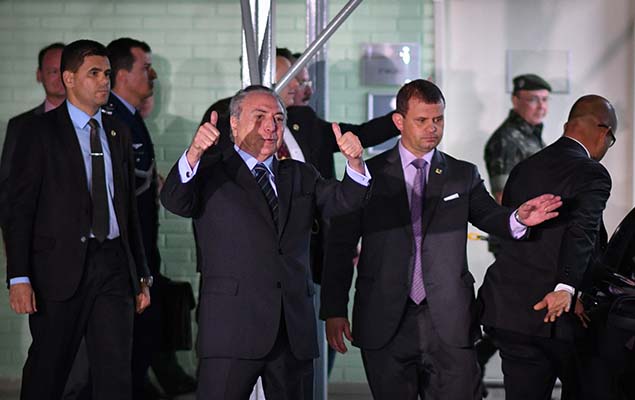Latest Photo Galleries
Brazilian Markets
16h07 Bovespa |
+1,67% | 126.732 |
16h43 Gold |
0,00% | 117 |
16h10 Dollar |
-0,93% | 5,1155 |
16h30 Euro |
+0,49% | 2,65250 |
ADVERTISING
Brazil's Congress Bars Second Charge Against President Temer
10/26/2017 - 11h24
Advertising
RANIER BRAGON
DANIEL CARVALHO
BRUNO BOGHOSSIAN
MARINA DIAS
BERNARDO MELLO FRANCO
CAMILA MATTOSO
FROM BRASÍLIA
Brazil's lower house of Congress on Wednesday (the 25th) barred the second charge brought against President Michel Temer by the Prosecutor General's Office.
With twelve fewer votes than for the previous voting on the first charge, President Michel Temer was able, by 251 votes to 233, to bar the continuation of proceedings on the second formal charge against him presented by the Prosecutor General's Office which would have authorized the Federal Supreme Court to analyze the accusation against him and two of his ministers, Eliseu Pdadilha (Chief of Staff) and Moreira Franco (Secretary-General).
Even though it took leaders eight hours to assemble the minimum necessary quorum of congressman to open the session, the result mirrors the outcome of the analysis of the first charge brought by the Prosecutor General's Office back in August.
Both cases - charges of passive corruption in the first and obstruction of justice and criminal organization in the second - will now remain frozen and will only return to be processed after the end of Temer's term, in January of 2019.
This result closes out a troubled political period that began in May with the release of an audio recording of a conversation between Temer and businessman Joesley Batista.
Based on these statements and other elements that were collected in the investigation, the former Prosecutor General of the Republic, Rodrigo Janot, signed off on both charges which effectively put Temer's term at risk - he even received counsel that he should resign immediately after the conversation was initially revealed.
In recent days, the government has been mobilizing the federal machinery in its efforts to bar the charge's proceeding.
Publicly, Temer and his ministers met with hundreds of congressman in individual meetings and promised to accelerate the freeing up of funds for parliamentary districts, to allocate federal positions and to provide other federal government benefits.
Behind closed doors, the President met the historical demands of, among others, the powerful rural caucus, which was able to push through, among other measures, new rules making it more difficult to demarcate indigenous lands, facilitating the renegotiation of rural debts and financing, and weakening environmental protection and the combatting of slave labor.
AMBULANCES
Congressmen took advantage of the situation to hold the government accountable for a promise to deliver nearly 6,000 ambulances made on the eve of the voting.
According to the president of a political party that is part of the government coalition, the vehicles were supposed to be delivered to municipalities through intermediation of the allied political party membership, but until now, nothing has happened.
Ricardo Barros, the Health Minister, told reporters that he was waiting for the Legislative branch to approve a credit of R$6 billion (US$ 1.86 billion) that would be utilized for the acquisition of the ambulances.
"It has nothing to do with the voting. This is a normal program, based on technical criteria", he declared.
President Michel Temer, 77, was admitted to hospital early in the afternoon on Wednesday (the 25th) and underwent an emergency procedure for an obstruction of his bladder passage. He was released after 8 PM.
When leaving the hospital, he gave a thumbs-up signal and said that he is "entirely fine" while leaving on route to the Jaburu Palace.
Temer had been at the Planalto Palace since 9 AM, following the voting on the charge against him that was proceeding in the lower house of Congress.
Near the end of the morning he began to feel pain and have difficulty urinating. He was attended by the Planalto's medical service and from there was sent on to the Army Hospital, where he was admitted at 12:50 PM.
Translated by LLOYD HARDER
Read the article in the original language
| André Borges/Agif/Folhapress | ||
 |
||
| When leaving the hospital, President Temer gave a thumbs-up signal and said he is "entirely fine" |



